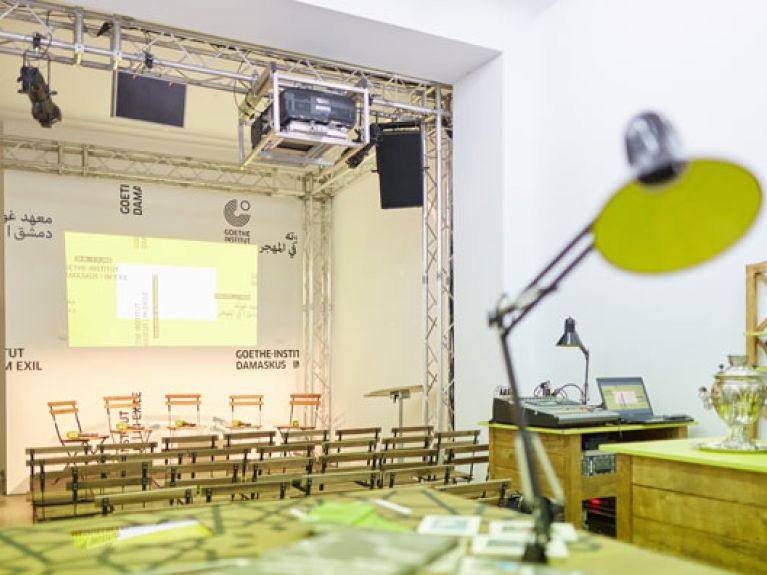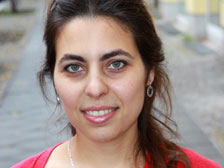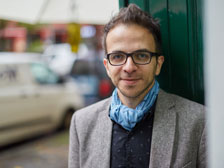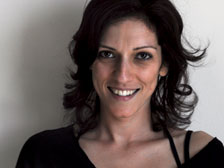“Bringing a small piece of Damascus to Berlin”
The Damascus Goethe-Institut is opening temporarily in the German capital – as a forum for artists from Syria and Germany. Three of the Syrian participants of the project “Goethe-Institut Damascus | In Exile” spoke to deutschland.de.


What is the subject of your video installation?
I interviewed Syrians from different backgrounds about the subject of dialogue – for example, writers, a construction entrepreneur and an artist. I was especially interested in finding out what problems arise when dialogue doesn’t work. I will use the ideas from the interviews to form something new – not only sculptures, but also textile works.
What was the starting point for your installation?
We asked ourselves: how can we transfer something that distinguished the Goethe-Institut in Damascus to Berlin? Since dialogue was a central aspect, that seemed appropriate. Another starting point was the subject of language. Languages like German are not easy to learn. At the same time, however, when it comes to integration there is strong pressure to learn the language fast to be able to engage in dialogue.
Why did you consider it important to contribute to shaping the project space?
I find the project touching, because it brings a small piece of Damascus into exile in Berlin. For me it is an interesting project because it promotes artistic exchange – and therefore also dialogue between artists of different languages.

What challenges did you face as an artist in Syria?
Before 2005 there were almost only government cultural spaces. If you wanted to organise an exhibition, you needed special permits. And you couldn’t get them so easily if you didn’t have any connections. From 2005 onwards, many private galleries opened, but most of them were interested in the commercial side of things. They tended to view art as an industry. That’s why many artists looked for alternatives. The Goethe-Institut in Damascus was one of them. Artists liked exhibiting their works there.
What is especially challenging for artists in exile?
The main thing is continuing artistic work. To do that, first of all you have to resolve very fundamental issues: you need a place to live and have to learn the language. You have to cultivate contacts and establish yourself in the artistic community. That takes time. Projects like “Goethe-Institut Damascus | In Exile” are therefore very important: they help to build bridges between artists from Syria and the society here in Germany.
Your animated film, Suleima, which is about a female activist during the Syrian revolution, is running as part of the project. Why did you choose this main character?
Her life describes the lives of many Syrians in an exemplary way: she works behind the scenes and suffers because of the war. Nevertheless, she repeatedly tries to help others. It is a small story from the revolution that represents many.

In 2011 you began to build up a dream archive. What does that involve?
I was interested in what happens at the unconscious level. I began with a Facebook page and asked people to tell me about their dreams. Later I also conducted interviews – for example, in refugee camps in Lebanon. I find it interesting to see how dreams have changed since the revolution in Syria. Also because of the question: do Syrians have a shared subconscious? I made dance theatre out of the dreams.
Within the framework of the project “Goethe-Institut Damascus | In Exile” you are taking part in a discussion entitled “Escape into Art?”. What concerns you about this question?
It has become fashionable to own art from the areas refugees leave. And everyone wants to make art for refugees. However, this raises the question: what happens to artistic quality? And: isn’t the subject of refugees being exploited? These are sensitive issues. I believe art should speak for itself.
If you had one wish as an artist in exile – what would it be?
In the last few years before the revolution there was a beautiful mood in Syria. It would be great if we had a permanent space here to continue that mood. A space to meet one another, to rehearse, to brainstorm and to revitalise ourselves. That would be wonderful.
www.deutschland.de/en/topic/culture/communication-media/cultural-exchange-in-exile

